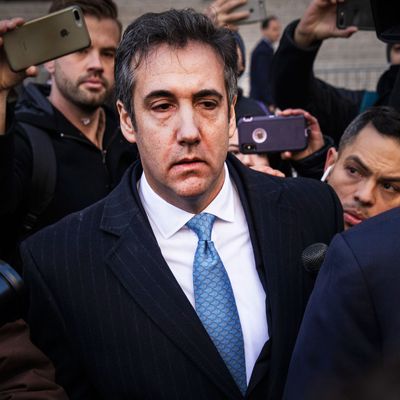
Pending future revelations from the Mueller investigation, the most pressing legal threat to Donald Trump stems from the campaign-finance laws his former attorney Michael Cohen has admitted he violated at Trump’s direction. The question of Trump’s criminal liability in a hypothetical prosecution for these acts largely revolves around the degree of his personal knowledge of, and involvement in, the evasion of these laws. If, as Trump claims, this was all a “simple private transaction” that had nothing to do with the fact that he was running for president at the time, he’s probably in the clear. Alternatively, if the payments were something Cohen cooked up without much understanding of the details from his client, that’s good for Trump as well.
Cohen’s first interview (with ABC’s Good Morning America) after being sentenced to three years in prison damaged both of these potential avenues for presidential exoneration, as the Wall Street Journal reports:
In the interview, Mr. Cohen gave his fullest public description of Mr. Trump’s involvement in payments Mr. Cohen had admitted to coordinating during the 2016 presidential campaign to silence two women who said they had sexual encounters with Mr. Trump.
“Nothing at the Trump Organization was ever done unless it was run through Mr. Trump,” Mr. Cohen said. “He directed me to make the payments. He directed me to become involved in these matters.”
Mr. Cohen said Mr. Trump dealt directly with David Pecker, chief executive of publisher American Media, the parent company of the National Enquirer, to silence former Playboy centerfold Karen McDougal. Ms McDougal says she had a nearly yearlong affair with Mr. Trump.
So much for the idea of the busy mogul who left all the messy business of hush payments to the help.
Cohen also made it clear that the effect of these transactions on Trump’s campaign was front and center in his client’s mind, certainly with respect to the Stormy Daniels payments:
Mr. Cohen said Mr. Trump was concerned about Ms. Clifford’s allegations after an “Access Hollywood” video of Mr. Trump talking about groping women became public in October 2016.
“He was very concerned about how this would affect the election,” Mr. Cohen said, adding that Mr. Trump knew the payment was wrong.
In other words, Cohen is directly alleging that Trump shared his criminal intent. That could be the basis of an indictment, though probably not while Trump is president. (Some legal scholars argue the president can’t be indicted while in office, though the issue hasn’t been settled.)
As the legal clouds darken above Trumpworld, the president’s associates are trying hard to dismiss the whole thing as a sort of multimillion-dollar parking violation. His latest attorney, Rudy Giuliani, actually served up that analogy:
“Nobody got killed, nobody got robbed… This was not a big crime,” Giuliani told The Daily Beast on Wednesday. He added, sardonically, “I think in two weeks they’ll start with parking tickets that haven’t been paid.”
Giuliani later walked that comment back by saying there was no crime at all, big or little.
The effort to treat what Trump did as routine is often accompanied by so’s-your-old-man references to violations for which earlier campaigns — notably Barack Obama’s — were fined. Election law expert Rick Hasen knocked that one down pretty firmly:
These were not “paperwork” errors, as both Trump and Rand Paul have spuriously claimed. Campaigns do make paperwork errors all the time, especially large campaigns like Obama’s or John McCain’s, which failed to file some reports within 48 hours of making some campaign expenditures. When campaigns make these minor errors, they promptly file a corrected report with the Federal Election Commission and then pay civil fines if necessary. What they don’t do: Deny for more than a year that they made an error, and try to hide campaign payments by funneling money through unreported corporate loans, LLCs, and payoffs falsely described as legal and technical services. These are serious criminal activities for which others have gone to jail, and for which Cohen apparently will spend time behind bars following his guilty plea.
Hasen also deals with the claim that John Edwards’s acquittal by a jury on similar charges somehow means Trump will be exonerated as well:
[I]t is the John Edwards prosecution which itself strengthens the case against Trump. Everyone knew that Edwards was on trial for having donors make payments to his mistress to help fund his campaign. This put Trump and everyone else on fair notice that federal prosecutors were treating such payments as reportable campaign expenditures in certain circumstances. Trump even tweeted about the case at the time. At the very least, the Edwards precedent should have caused Trump to seek advice of counsel on whether payments made to hush up mistresses timed specifically to help his election campaign were illegal.
Maybe he did, and went ahead anyway.
Yes, the hypothetical prosecution of Donald Trump over campaign-finance violations raises all sorts of difficult questions about the appearance it would create of political vengeance — questions that will be even more pressing if Trump isn’t indicted, but instead faces possible impeachment. But it’s getting hard for Trump and his satraps to credibly claim he was an innocent bystander in the crimes Cohen is confessing. And every time Cohen opens his mouth, the case against his former boss gets stronger.






























